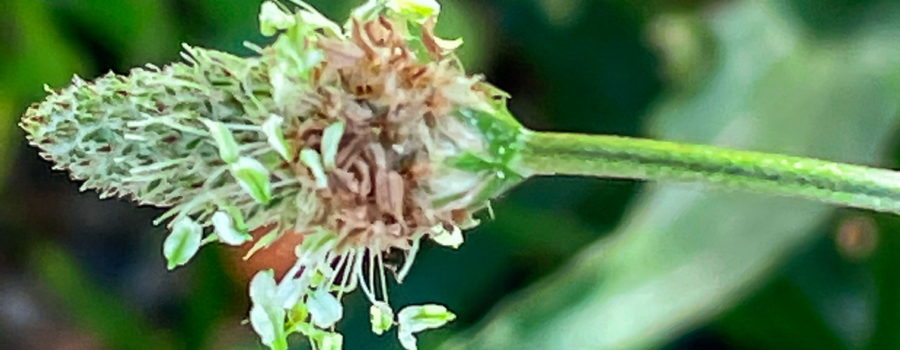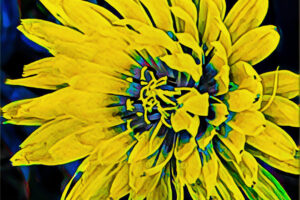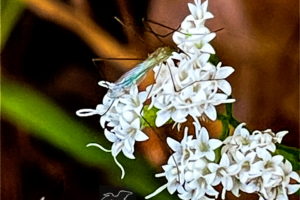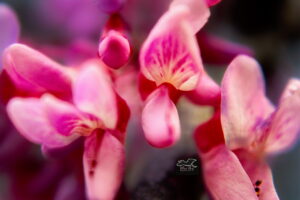Narrow Leaf Plantain; a Useful, Beautiful Weed

Every spring, throughout the summer, and into the fall the roadsides, pastures, woods edges, and pretty much any sunny, disturbed area, you can find a tall, narrow leafed plant with clusters of very small white flowers on top of a thin stalk. This year this particular weed is doing well since we are currently in a drought. Many of our roadside weeds (and all our beautiful wildflowers) are suffering from the lack of rain, but this one will grow in both dry and fairly wet habitats, as long as there is plenty of direct sunlight. So what is this plant? It is narrow leaf plantain, also known as lamb’s tongue, ribwort plantain, English plantain, buckhorn plantain, and a host of other names.

Narrow leaf plantain is native to Europe and Asia, but it has been introduced to much of the rest of the world and does well anywhere that there is suitable habitat. In many places it is considered an invasive weed since it is highly adaptable and will often out compete native species, but it also has quite a few uses. It’s high degree of adaptability makes narrow leaf plantain an ideal plant to cover disturbed areas with poor soil where many other plants won’t grow. By providing ground cover in such areas it helps to prevent soil erosion and loss to the elements. Some people also eat narrow leaf plantain leaves and seeds. The leaves can be boiled, sautéed, or eaten raw. The seeds can also be eaten roasted or ground into flour. The seeds are very, small though, so collecting enough of them to be worthwhile can be challenging.

Herbal medicine is full of many uses for narrow leaf plantain. Teas can be made with leaves and used to treat bloody urine, diarrhea, and coughs. Some of the leaf chemicals have bronchodilator properties, so teas can also be used to treat bronchitis and colds. If the leaves are crushed and made into a poultice or plaster they can be used on sores, blisters, cuts, swelling, and insect bites. The seeds, either roasted or crushed have been known to reduce elevated cholesterol levels and may have some beneficial effects on elevated blood pressure as well (although other types of plantains may work better).

Narrow leaf plantain is not only useful to people, but it is good for some animals, too. Many types of birds feast on the seeds, and they are a good source of protein. Deer and rabbits both love to graze on this plant. Some domestic herbivores, especially sheep and goats, also like narrow leaf plantain (hence the name I know it by, lamb’s tongue). Others though (especially cattle and horses) find some of the chemicals in the leaves to be unpleasant and won’t eat it unless nothing else is available. Some of those same chemicals make the leaves highly attractive to several types of butterfly. The butterflies will lay their eggs on the leaves. When the eggs hatch, the caterpillars eat the leaves, and the leaf chemicals make the caterpillars unpalatable to predators.

You may very well have narrow leaf plantain in your area, or even in your lawn. If frequently mowed, this plant will develop a flattened stature (another adaptation). You can still recognize the seed heads with their rings of tiny white flowers. Each flower forms a small, individual seed that if not eaten, will be dispersed by the wind. So keep an eye out for this pretty, very adaptable, and very useful weed. If you spend time outdoors, narrow leaf plantain is probably somewhere around you. Just keep an eye out for it!






Recent Comments